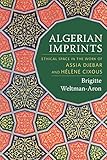Algerian Imprints : Ethical Space in the Work of Assia Djebar and Hélène Cixous / Brigitte Weltman-Aron.
Material type: TextPublisher: New York, NY : Columbia University Press, [2015]Copyright date: 2015Description: 1 online resource (232 p.)Content type:
TextPublisher: New York, NY : Columbia University Press, [2015]Copyright date: 2015Description: 1 online resource (232 p.)Content type: - 9780231172561
- 9780231539876
- 843/.914 23
- online - DeGruyter
| Item type | Current library | Call number | URL | Status | Notes | Barcode | |
|---|---|---|---|---|---|---|---|
 eBook
eBook
|
Biblioteca "Angelicum" Pont. Univ. S.Tommaso d'Aquino Nuvola online | online - DeGruyter (Browse shelf(Opens below)) | Online access | Not for loan (Accesso limitato) | Accesso per gli utenti autorizzati / Access for authorized users | (dgr)9780231539876 |
Frontmatter -- Contents -- Acknowledgments -- Introduction: Dissensus; or, The Political in the Writings of Djebar and Cixous -- PART ONE: Colonial Demarcations -- chapter one The Gravity of the Body: Djebar’s and Cixous’s Textuality -- Chapter two Going to School in French Algeria: The Archive of Colonial Education -- PART TWO: Poetics of Language -- Chapter three: Vanishing Inscriptions: Djebar’s Poetics of the Trace -- Chapter four: Poetic Inc.: Language as Hospitality in Cixous -- PART THREE: Algerian War -- Chapter five: The Sound of Broken Memory: Djebar’s Women Fighters -- Chapter six: Allergy in the Body Politic: War in Cixous -- Conclusion: The Logic of the Veil; or, The Epistemology of Nonseeing -- Notes -- Bibliography -- Index
restricted access online access with authorization star
http://purl.org/coar/access_right/c_16ec
Born and raised in French Algeria, Assia Djebar and Hélène Cixous represent in their literary works signs of conflict and enmity, drawing on discordant histories so as to reappraise the political on the very basis of dissensus.In a rare comparison of these authors' writings, Algerian Imprints shows how Cixous and Djebar consistently reclaim for ethical and political purposes the demarcations and dislocations emphasized in their fictions. Their works affirm the chance for thinking afforded by marginalization and exclusion and delineate political ways of preserving a space for difference informed by expropriation and nonbelonging. Cixous's inquiry is steeped in her formative encounter with the grudging integration of the Jews in French Algeria, while Djebar's narratives concern the colonial separation of "French" and "Arab," self and other. Yet both authors elaborate strategies to address inequality and injustice without resorting to tropes of victimization, challenging and transforming the understanding of the history and legacy of colonized space.
Mode of access: Internet via World Wide Web.
In English.
Description based on online resource; title from PDF title page (publisher's Web site, viewed 20. Nov 2024)


